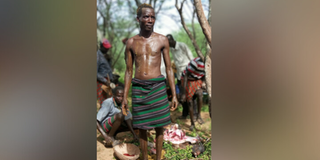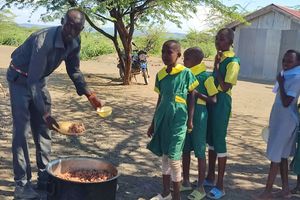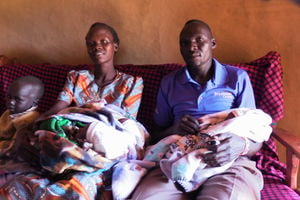
Initiate Tulel Ng’uriangole being smeared with animal stomach contents during Sapana initiation ceremony at Nyangaita shrine in West Pokot county on May 3, 2024.
It is 8am on a Friday in Masol area, West Pokot. A bare-chested man, with a kikoi wrapped around his waist stands atop dung that has just been scooped from a goat's stomach. The man's hair, legs, hands, and chest are smeared with the goat dung.
He is Tulel Ng'uriangole, a 35-yearold. An elderly man holds Tulel's hand and turns him around for another man to smear a new, thicker layer of goat dung on his head. They complete the ritual.
Tulel puts on his sandals and carries his spear, the one he had used to kill the goat, and leaves the men to lap up the raw blood, directly from the belly of the goat. Welcome to Sapana, a ceremony held among the Pokot to usher a man into manhood. Without this dung-smearing and killing an animal with a spear, a man is not considered man enough to marry.

Initiate Tulel Ng’uriangole being smeared with animal stomach contents during Sapana initiation ceremony at Nyangaita shrine in West Pokot county on May 3, 2024.
Nation.africa attended Tulel's Sapana ceremony.
The smearing with dung, fresh from a goat’s stomach by a respected elder, is a sign of wiping childhood into adulthood. When this dung session is done, Tulel holds the spear to prove that "he can do it" as ululations rent the air. There are tens of women and men here to feast and perform the ritual.
The men are wearing tiny shorts tucked inside kikois, the women in lokwa skirts and lots of beaded jewellery. The women are allowed to participate in the ceremony because they bring milk.
They jump up as they sing a Pokot chorus of folk songs. Other men are gathered at a bonfire in a semi-circle, and women on the other side are drinking fermented local wine. “I have never seen a huge crowd like this. I'm now a full man.
Now I will offer honey and organise another ceremony for thanksgiving to give out the honey,” Tulel says. The West portends evil According to Pokot tradition, a bull (not one whose tail has been cut, or without horns or a hollow eye) must lie facing the East for blessings, because the West brings about evil.
Tulel pierces the goat on its right side until it dies before it is burned over a fire, whole, without cutting it into pieces, a requirement in this ritual.
A special group of village men take over and open up the slaughtered animal, taking turns to lap up the clots of blood. Some of the blood is kept in a container to be mixed later with milk, a traditional delicacy to be shared. After all this is done, the goat is skinned and cut into pieces. The elders inspect it thoroughly while explaining the contours of the goat’s intestines to predict calamities, ranging from death to strange diseases, and forecast the weather pattern. From the intestines analysed today, it was established that the village would experience rain and everyone should go to the farm to cultivate.

Pokot Sapana ritual initiateTulel Ng’uriangole preparing a goat for piercing a goat during his Sapana initiation ceremony at Nyangaita shrine in West Pokot county on May 3, 2024.
The men then take their place in a semi-circle (Kriket) and wait for the animal to be cooked and served to them. Once the ‘sapana’ is over, a "special kind of soil" is applied on Tulel's head and he is adorned with brown ostrich feathers as the women dance in celebration. For decades, the Pokot community that lives in Northern Kenya has been known for its retrogressive cultural practices of cattle rustling and female genital mutilation (FGM), which are gradually dying off.
But there are positive ones, like the modern “Sapana” ritual, which centres on the initiation of boys into adulthood, and the gateway to manhood, which the elders hope will stay on.
Years ago, sapana was done to prepare men for war, but now it is a rite of passage for a man. 12 years Starting at around 12 years of age, young Pokot men would traditionally undergo the Sapana ritual.
The day before an initiation ceremony, the initiate climbs on the back of a cow near his home. On D-Day, the man who kills the bull, goat, or ram goes into the kraal, brandishing his spear. He pierces the bull on its right side.
Usually, a single thrust of the spear should kill the bull. It is directed at the heart. If the animal falls and fails to die, it must be pierced again, but that means the initiate is a sinner. William Lopetakou, a Pokot culture elder, says the Sapana ritual allows young men to sit at the table with the elders and take part in their community’s decision-making. Mr Lopetakou says the ritual originated from the Ateker Karamojong people in Uganda. “The Pokots have embraced it for many decades now.
The ceremony is somewhat religious to chase away evil spirits. It also brings togetherness. For instance, a wooden trough of milk is shared amongst all the people to remove bad omens," he says, "and it reminds the Pokots of the respect they have for cows.
After God comes a man, a cow, and then a woman." He adds that the initiator is washed with milk to get rid of curses.
“This indicates that you are free from dirty things like sexually transmitted diseases,” Mr Lopetakou says. The ceremony also seals marriages. "A married Pokot woman wears a traditional ring on her hand, through the Sapana rite.
If you try seducing such a woman, you are fined,” he says. With modernisation, he says, educated people have shunned the ceremony. “But an undergraduate degree or Master's degree alone doesn't make you a man.
Even if you have these, how will you interact with elders? The rite of passage will see you eat and drink with others, they no longer see you like a child,” he says. Julius Loparar, an elder from Nyangaita Village, says the ritual improves men's marriage prospects. "Only after a Sapana are you able to negotiate dowry with the elders," he says.
Benson Lemnyang, the West Pokot Director of Culture and Heritage, says the ritual improves one’s chances for marriage, once the man and his family have accumulated a dowry of cattle,” he says.
John Muok, who is currently the Pokot Council of Elders Chairperson, and is 80 years old, underwent the rite when he was 25. He says he performed the ritual after marrying two wives. “I slaughtered a big bull. It was a great ceremony, and my parents were very happy to see how blessed I was,” he says.
Heroine Evelyn Prech, who is the Executive Director at the Center of Indigenous Child Rights, (CIC), says the county should start marketing the ceremony as a tourist attraction.
"There is a need to show positive cultures like Adong’o and Sapana, good farming, and honey displays," she says.







